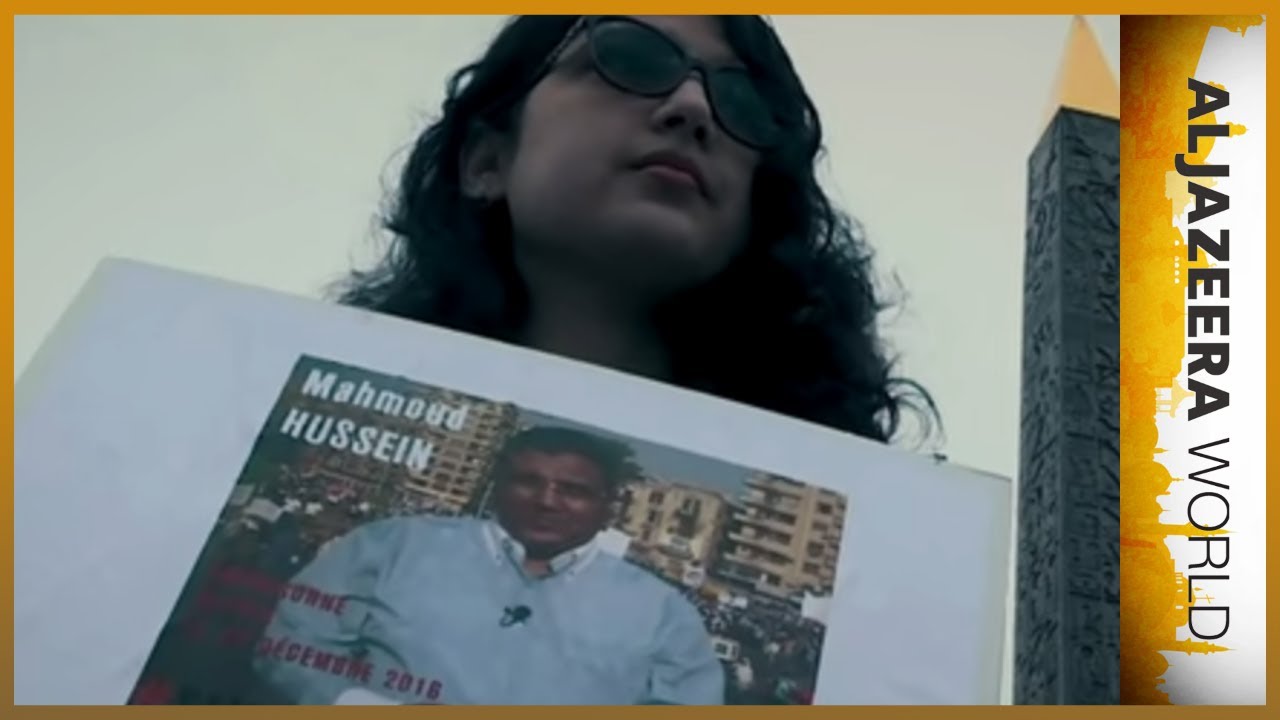Journalism is Not a Crime: The Story of Mahmoud Hussein | Al Jazeera World
In December 2016, Egyptian security forces arrested Al Jazeera journalist Mahmoud Hussein while on holiday in Cairo.
There have been no formal charges against Hussein, an Egyptian national based in Doha, Qatar. He’s accused of “incitement against state institutions and broadcasting false news with the aim of spreading chaos”.
However, article 71 of the Egyptian constitution says that: “no custodial sanction shall be imposed for crimes committed by way of publication or the public nature thereof”.
Al Jazeera has rejected the allegations against Hussein and has called on Egypt to unconditionally release him.
His detention is the latest in a series of arrests by Egyptian authorities of the network’s staff there.
In May 2016, Ibrahim Helal, former editor-in-chief of Al Jazeera Arabic, was sentenced to death in absentia for purportedly endangering national security. Several other colleagues have also been charged in absentia, such as journalists Sue Turton and Dominic Kane.
Egypt also imprisoned Al Jazeera’s Abdullah Elshamy, Baher Mohamed, Mohamed Fahmy and Peter Greste on charges of spreading “false news”, in a case that was widely condemned by international media outlets and many politicians. All have since been released.
Reporters Without Borders ranked Egypt 161 out of 180 in its 2017 press freedom index, a “black list” of countries considered “prisons for journalists”.
“According to our statistics in 2016, we noticed there were at least 20 journalists behind bars because of their work,” says Alexandra El Khazen from Reporters Without Borders. “They’d find themselves in a group political trial with hundreds of others accused. The accusations against them are political, because of their journalistic work, as if they were activists or terrorists.”
Wade McMullen, an international lawyer for the Robert F. Kennedy Human Rights group, says that “the state [Egypt] is pretty much employing all the tools that we see repressive regimes around the world employ in order to restrict civic space, all at once. So there is direct intimidation, harassment, arrest of human rights defenders and journalists and activists, torture and mistreatment of those individuals once they are arrested and then detained.”
The Egyptian media has also played a part in discrediting Mahmoud Hussein. TV channels launched a campaign against a man who was once a colleague, having started his career in Egyptian state media and then worked as chief correspondent for the government-run Nile TV channel.
“On TV, they said he was a terrorist and someone who disseminated false news. They said he ran a secret network to spread chaos in the country. They were all baseless accusations,” says Aya Hussein.
Mahmoud Hussein’s current colleagues describe him as a trustworthy, passionate and experienced journalist. Al Jazeera Arabic presenter Mohammad Krichen says, “He did his job objectively. He always maintained balance and professionalism in his reportage.”
“Mahmoud’s media experience is very rich. He has worked with many TV channels,” says Anas Zaki, a lifelong friend of Mahmoud Hussein. “He served as Cairo bureau chief for a couple of Arab TV channels. He travelled dozens of times to several Arab countries, especially Palestine … Mahmoud isn’t complicated. He discusses all opinions and is open to all viewpoints. He doesn’t anchor his personal relationships in ideology, politics or even religion. He is friends with Islamists, liberals and Nasserites, regardless of ideology.”
Several agencies have asked the Egyptian government to explain why Mahmoud Hussein has been imprisoned without trial; and, in February 2018, the UN called for his immediate release.
“We wrote letters as soon as he was detained to the Egyptian President Abdel Fattah el-Sisi and to the Egyptian embassy in Brussels because it is close to the IFJ office,” explains Philippe Leruth, president of the International Federation of Journalists.
“We denounced the fact that he was jailed and asked why precisely our colleague was detained. We received no answer from the Egyptian authorities. We also wrote letters to the United Nations secretary-general, who was Mr Ban Ki Moon by that time, to denounce the fact and the United Nations worry about the press freedom situation in Egypt in general.”
Mahmoud Hussein remains in Egyptian jail without due process. There have been many expressions of solidarity with Hussein, under the same banner as the campaign to free Abdullah Elshamy, Baher Mohammed, Mohammed Fahmy and Peter Greste: Journalism Is Not A Crime.
More from Al Jazeera World on:
YouTube – http://aje.io/aljazeeraworldYT
Facebook – https://www.facebook.com/AlJazeeraWorld
Twitter – https://twitter.com/AlJazeera_World
Visit our website – http://www.aljazeera.com/aljazeeraworld
Subscribe to AJE on YouTube – http://aje.io/YTsubscribe




![Private: [ID: 9sSMjmulbSM] Youtube Automatic](https://nezha.pro/wp-content/uploads/2023/08/private-id-9ssmjmulbsm-youtube-a-236x133.jpg)
![私密內容: [ID: vOErbAXbHmo] Youtube Automatic](https://nezha.pro/wp-content/uploads/2023/08/id-voerbaxbhmo-youtube-automati-236x133.jpg)
![私密內容: [ID: 9OKAgo7yn3U] Youtube Automatic](https://nezha.pro/wp-content/uploads/2023/08/id-9okago7yn3u-youtube-automati-236x133.jpg)
![私密內容: [ID: geb2Vb2fbss] Youtube Automatic](https://nezha.pro/wp-content/uploads/2023/08/id-geb2vb2fbss-youtube-automati-236x133.jpg)
![私密內容: [ID: zSXoeqoIwL4] Youtube Automatic](https://nezha.pro/wp-content/uploads/2023/08/id-zsxoeqoiwl4-youtube-automati-236x133.jpg)
![私密內容: [ID: 9c8aHubW7w4] Youtube Automatic](https://nezha.pro/wp-content/uploads/2023/07/id-9c8ahubw7w4-youtube-automati-236x133.jpg)
![私密內容: [ID: 9W4-q3cFxSA] Youtube Automatic](https://nezha.pro/wp-content/uploads/2023/06/id-9w4-q3cfxsa-youtube-automati-236x133.jpg)
![私密內容: [ID: __dHaABgd1E] Youtube Automatic](https://nezha.pro/wp-content/uploads/2023/06/id-dhaabgd1e-youtube-automatic-236x133.jpg)
![私密內容: [ID: ALM6rESu6S4] Youtube Automatic](https://nezha.pro/wp-content/uploads/2023/06/id-alm6resu6s4-youtube-automati-236x133.jpg)
![私密內容: [ID: xJwT02swkuA] Youtube Automatic](https://nezha.pro/wp-content/uploads/2023/05/id-xjwt02swkua-youtube-automati-236x133.jpg)